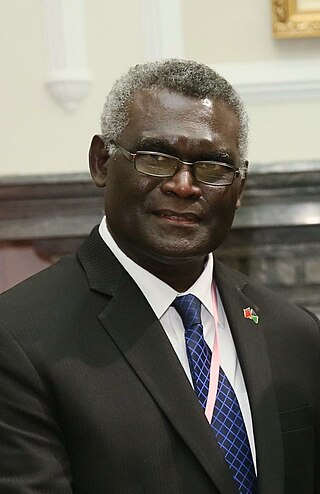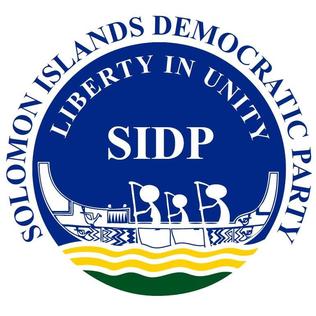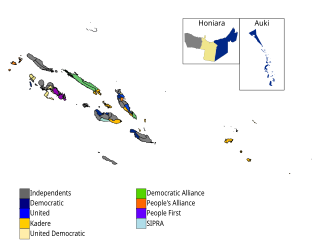Solomon Islands United Party | |
|---|---|
| Abbreviation | UP |
| Founder | Peter Kenilorea |
| Founded | March 1980 |
| Colours | Blue, White, Black |
| National Parliament of Solomon Islands | 6 / 50 |
 |
|---|
The Solomon Islands United Party (UP) is a political party in Solomon Islands. [1]
Solomon Islands United Party | |
|---|---|
| Abbreviation | UP |
| Founder | Peter Kenilorea |
| Founded | March 1980 |
| Colours | Blue, White, Black |
| National Parliament of Solomon Islands | 6 / 50 |
 |
|---|
The Solomon Islands United Party (UP) is a political party in Solomon Islands. [1]
The party was established in March 1980 by Prime Minister Peter Kenilorea, [2] and was based on the government he had led since 1978. [3] Kenilorea had initially been an independent, but sought to form a party in the build-up to the 1980 general elections. The party won 16 of the 38 seats and Kenilorea remained Prime Minister after forming a coalition government with the Independent Group. However, the government fell in 1981 after the Independent Group pulled out, at which point the People's Alliance Party's Solomon Mamaloni was able to form a coalition government with the National Democratic Party and independent MPs. [3]
The party retained significant public support throughout the 1980s, [4] and despite receiving fewer votes than the PAP in the 1984 elections, it won the most seats and Kenilorea returned as Prime Minister. He was succeeded by fellow SIUP member Ezekiel Alebua in 1986. However, the party won only four seats in the 1989 elections. The 1993 elections saw it reduced to three seats, and although it gained a seat in the 1997 elections, it lost parliamentary representation in the 2001 elections.
The party was revived in the build-up to the 2010 general elections when the new president, Joel Moffat Konofilia, launched its manifesto in July 2010. He claimed that God had cursed the Solomon Islands to punish the country for "vot[ing] against the nation of Israel" at the United Nations. Asking forgiveness from God, he added that "starting today and onward the United Party will vow its support and vote for Israel unconditionally in obedience to Genesis 12: 1–3". He stated that his beliefs and actions as leader, if elected, would be "rooted deeply in the word of God". [5] However, it ultimately did not contest the elections.
The party contested the 2019 general election, and won two parliamentary seats.
In the lead up to the 2024 general election, the party launched its campaign on 7 March 2024. A core aspect of the UP's manifesto was unity in diversity; the party advocated for developing a "real national identity" whilst preserving the ethnically diverse nation's numerous cultural identities. [6] Party leader Peter Kenilorea Jr., son of the nation's first prime minister, Peter Kenilorea, [7] announced the UP would re-establish ties with Taiwan while maintaining relations with China and reviewing China's security deal. [8] The party also sought to preserve relations with traditional development partners, although Kenilorea warned that Solomon Islands should not hold them as the country's sole saviours. [9] The UP called for a diversification of the economy and warned that the country's reliance on limited income streams, especially logging exports, left Solomon Islands vulnerable to external economic crises. Addressing issues regarding critical infrastructure structure was another priority for the party, particularly the poor state of the roads and bridges. [10] The party would go on to win 6 seats in the election.
| Election | Votes | % | Seats | +/– |
|---|---|---|---|---|
| 1980 | 10,437 | 18.10 (#1) | 16 / 38 | New |
| 1984 | 14,661 | 21.42 (#2) | 13 / 38 | |
| 1989 | 14,703 | 18.17 (#2) | 4 / 38 | |
| 1993 | 12,973 | 10.50 (#4) | 3 / 47 | |
| 1997 | N/A | N/A | 4 / 50 | |
| 2001 | Did not contest | 0 / 50 | ||
| 2006 | 324 | 0.17 (#11) | 0 / 50 | |
| 2010 | Did not contest | 0 / 50 | ||
| 2014 | Did not contest | 0 / 50 | ||
| 2019 | 32,302 | 10.43 (#5) | 2 / 50 | |
| 2024 | 46,662 | 13.49 (#3) | 6 / 50 | |

Solomon Islands is a sovereign state in the Melanesia subregion of Oceania in the western Pacific Ocean. This page is about the history of the nation state rather than the broader geographical area of the Solomon Islands archipelago, which covers both Solomon Islands and Bougainville Island, a province of Papua New Guinea. For the history of the archipelago not covered here refer to the former administration of the British Solomon Islands Protectorate, the North Solomon Islands and the History of Bougainville.

Politics of Solomon Islands takes place within the framework of a parliamentary representative democratic, constitutional monarchy. Solomon Islands is an independent Commonwealth realm, where executive power is exercised by the government. Legislative power is vested in both the government and a multi-party parliament.

Solomon Islands, also known simply as the Solomons, is a country consisting of six major islands and over 900 smaller islands in Melanesia, part of Oceania, to the northeast of Australia. It is directly adjacent to Papua New Guinea to the northwest, Australia to the southwest, New Caledonia and Vanuatu to the southeast, Fiji, Wallis and Futuna, and Tuvalu to the east, and Nauru and the Federated States of Micronesia to the north. It has a total area of 28,896 square kilometres, and a population of 734,887 according to the official estimates for mid 2023. Its capital, Honiara, is located on the largest island, Guadalcanal. The country takes its name from the wider area of the Solomon Islands archipelago, which is a collection of Melanesian islands that also includes the Autonomous Region of Bougainville, but excludes the Santa Cruz Islands.

Sir Peter Kenilorea was a Solomon Islander politician, officially styled The Rt Hon. Sir Peter Kenilorea as a member of the Privy Council of the United Kingdom. He was the first prime minister of an independent Solomon Islands, from 1978–1981, and also served a second term from 1984–1986.

Manasseh Damukana Sogavare is a Solomon Islander politician who served as the prime minister of Solomon Islands from 24 April 2019 until his successor, Jeremiah Manele took office in May of 2024. He previously held the office in 2000–2001, 2006–2007, and 2014–2017; in all, he has served over nine years as prime minister. Before becoming prime minister, Sogavare served in the National Parliament representing East Choiseul since 1997.

Bartholomew (Bart) Ulufa'alu CMG was the prime minister of Solomon Islands from 27 August 1997 to 30 June 2000.

The Solomon Islands Democratic Party is a political party in Solomon Islands. In a country in which political parties tend to be small and transient, and to obtain very few seats in Parliament, the Democratic Party has played a comparatively major role in recent history.

Oceania is, to the People's Republic of China and the Republic of China, a stage for continuous diplomatic competition. The PRC dictates that no state can have diplomatic relations with both the PRC and the ROC. As of 2024, eleven states in Oceania have diplomatic relations with the PRC, and three have diplomatic relations with the ROC. These numbers fluctuate as Pacific Island nations re-evaluate their foreign policies, and occasionally shift diplomatic recognition between Beijing and Taipei. The issue of which "Chinese" government to recognize has become a central theme in the elections of numerous Pacific island nations, and has led to several votes of no-confidence.
Edward Huni'ehu was a Solomon Islands politician.

Gordon Darcy Lilo is a Solomon Islander politician who served as the prime minister of Solomon Islands from 16 November 2011 to 9 December 2014. He was a member of the National Parliament of the Solomon Islands, representing the Gizo/Kolombangara constituency spanning Gizo and the island of Kolombangara in Western Province. Lilo served as the Minister of Finance of the Solomon Islands from 2006 to 2007 and from 2010 to 2011.
The Ownership, Unity and Responsibility Party is a political party in the Solomon Islands. It is headed by Jeremiah Manele and has competed in the 2010 and 2024 elections.

General elections were held in the Solomon Islands on 22 June 1976. Although contested by three political parties, the Independent Group emerged as the largest group in the Legislative Assembly, and elected Peter Kenilorea Chief Minister.

General elections were held in the Solomon Islands on 6 August 1980. They were the first since independence has been achieved two years earlier. The Solomon Islands United Party led by Prime Minister Peter Kenilorea emerged as the largest party, winning 16 of the 38 seats. Following the elections, Kenilorea was re-elected Prime Minister.

General elections were held in the Solomon Islands on 24 October 1984. A total of 230 candidates contested the elections, the result of which was a victory for the Solomon Islands United Party, which won 13 of the 38 seats, despite receiving fewer votes than the People's Alliance Party.
A by-election was held in the East ꞌAreꞌare constituency in the Solomon Islands on 1 August 2012. It was initially scheduled for the month of March, then delayed.

The Independent Group (IG) is a political faction in the Solomon Islands comprising the independent members of the Solomon Islands Parliament.

The Solomon United National Party (SUN) was a political party in the Solomon Islands.

General elections were held in Solomon Islands on 3 April 2019 to determine the composition of the 11th Parliament. The election was the first to occur since the conclusion of the Regional Assistance Mission to the Solomon Islands (RAMSI) in 2017. Parliament passed amendments to the electoral act in 2018 that included the introduction of pre-polling, a significant increase in campaign budgets for candidates and stricter penalties for individuals committing electoral offences such as vote-buying. Ten of the thirteen parties that contested the election won seats, and the Solomon Islands Democratic Party and the Kadere Party were the parties that secured the highest amount, winning eight each. However, as in previous elections, independent candidates won the largest share of seats, securing 21.

Peter Kenilorea Jr. is a Solomon Islander politician. He is the son of Peter Kenilorea, and was elected to the National Parliament of Solomon Islands in 2019.

General elections were held in Solomon Islands on 17 April 2024 to determine the composition of the 12th Parliament. Initially planned for 2023, parliament voted in 2022 to delay the elections. Prime Minister Manasseh Sogavare claimed the country could not afford to have an election in the same year the Solomon Islands were hosting the Pacific Games. The opposition condemned the delay and accused Sogavare of a power grab.